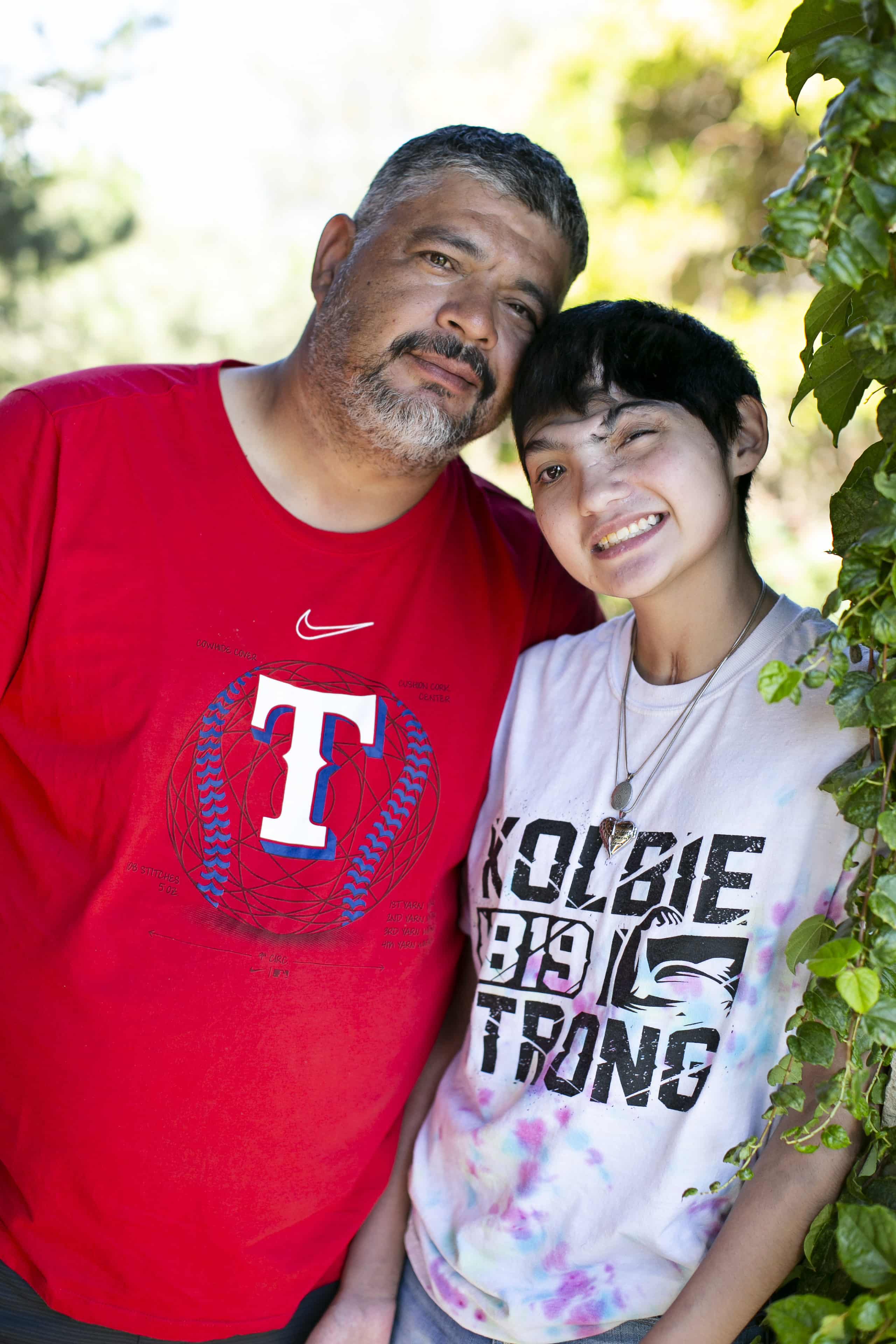Astonishment. Perspective. These words come to mind while sitting across the table from one of our CMN Miracle Children, Kolbie Ramos. This is the second time I’ve seen her—the first time was at a park where we did her initial photo shoot for the Children’s Miracle Broadcast on KCBD NewsChannel 11, which aired on September 21st. As her father, Michael Ramos, parked, his daughter Kolbie opened the door and swung a black quad cane out from the threshold. “Can you help me?” she asked her father bashfully, to which he replied, “No, girl, you can do it. Come on, you can do it.” She did, every movement careful and trained.
Kolbie is one of our patients whose trauma is visible. A tragic accident on the way back from out of town resulted in Kolbie and Michael losing loved ones and severe, life-threatening injuries to both Kolbie and her sister. Kolbie, as a result, lost about 30% of her brain tissue, an intervention the neurosurgeon worried would have an unknown impact on her quality of life. Her father decided to move forward with the procedure to save her life and turned the rest over to “the man upstairs.” But during the long recovery period, something showed Michael that things would be better than predicted. Kolbie, who would do sign language with her sister at the breakfast table on weekends with her dad, began signing in her hospital bed. She was trying to communicate with her father when her injuries prevented her from speaking. “She played catch with me. She couldn’t catch the ball, but she would take the ball in her hand and throw it to me.”
Michael’s coaching as she left the truck, his suggestion that “she could do it,” was part of a miraculous recovery process. The girl in front of us, soaking up the attention, loving having her photo taken, was a girl full of spirit and inspiration. She wore a tie-dye shirt that read “Kolbie Strong,” the name of her proposed foundation, where she hopes to talk to and connect with children who have been through the types of struggles she’s experienced. “I get nervous sometimes talking to a lot of people, but I can do it.” Her speech patterns are articulate and thoughtful, and every word drips with a deft mischievousness, a “sass” her dad admits is three times worse since the accident. Together, sitting with her and her father, she talks about the future and how she’s undergoing the slow reconstruction of her skull and face. She shows me pictures of her before the accident, and I know she wants me to see her. She admits to struggling with her changed appearance and the absence of those lost in the accident. But she teases her dad, issues mottos of hope and perseverance, and smiles as she talks about her progress and recovery.
How is this all possible? How can someone who’s experienced so much tragedy and heartache shine like the sun, full of resolute joy and resilience?
Stop. Stop for a minute and consider your role in the health system. Maybe you deal with patients directly every single day. Maybe you greet them at the door and give them directions. Maybe you help them process insurance or sort out funding. You make sure the IT systems work efficiently or that we’re in legal compliance. You go home every day, exhausted, overwhelmed, maybe at the end of a full twelve-hour shift to have to attend to a family and household of your own that couldn’t quite understand your day-to-day. Maybe your heart broke. Maybe you laughed in a way you hadn’t for years with a stranger, a family member of a sick patient. Did you sit beside someone as they breathed their last breath, say a small prayer you were unsure they could hear? Did you give a part of yourself to this hospital’s mission? And when you left work for the day, did you maybe never see that patient again and wonder (if you even had time to wonder) what happened to them?
Kolbie, the future founder of Kolbie Strong, a foundation meant to counsel children who have suffered overwhelming loss, Kolbie, who wakes up every day and pushes herself to keep her feet straight when she’s walking, who smiles and jabs at her dad, who is relentless in his coaching, Kolbie, who lost family members closest to her but still sees the good in almost everything, Kolbie, who promised one day to walk through those Pediatric ICU doors despite an unknown prognosis, Kolbie, who is alive because of the work every single one of us does jointly, dreams because we helped save her life and continue to help put it back together.
Stop. Consider the differences we make. Remember why we do what we do and the goodness we foster in this world. “I’m so proud of them and so thankful for all of them,” Michael said through tears about the caregivers at UMC. “Thank you,” he said. Thank you.
